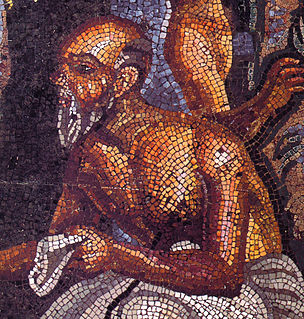A Quote by Simonides of Ceos
There is no better test of a man's work than time, which also reveals the thoughts which lay hidden in his breast.
Related Quotes
A man only begins to be a man when he ceases to whine and revile, and commences to search for the hidden justice which regulates his life. And he adapts his mind to that regulating factor, he ceases to accuse others as the cause of his condition, and builds himself up in strong and noble thoughts; ceases to kick against circumstances, but begins to use them as aids to his more rapid progress, and as a means of the hidden powers and possibilities within himself.
God has not revealed all things to man and has entrusted us with but a fragment of His mighty work. But He who directs all things, who has established and laid the foundation of the world, who has clothed Himself with Creation, He is greater and better than that which He has wrought. Hidden from our eyes, He can only be reached by the spirit.
You are different from the really great man in only one thing: The great man, at one time, also was a very little man, but he developed one important ability: he learned to see where he was small in his thinking, and actions. Under the pressure of some task which was dear to him he learned better and better to sense the threat that comes from his smallness and pettiness. The great man, then, knows when and in what he is a little man.
Man is more than his environment. It is from the innate quality of the Spirit in him, his inner storehouse, that he draws those ideas, his intuitions, which unify his perceptions of the external world instantaneously with a value which is qualitative and not quantitative, and which he embodies in the works of his culture - those achievements which belong not only to one particular time but to all times, and mark the path of his upward progress.
Conscience is a judge in every man's breast, which none can cheat or corrupt, and perhaps the only incorrupt thing about him; yet, inflexible and honest as this judge is (however polluted the bench on which he sits), no man can, in my opinion, enjoy any applause which is not there adjudged to be his due.
How shall we define occultism? The word is derived from the Latin occultus, hidden; so that it is the study of the hidden laws of nature. Since all the great laws of nature are in fact working in the invisible world far more than in the visible, occultism involves the acceptance of a much wider view of nature than that which is ordinarily taken. The occultist, then, is a man who studies all the laws of nature that he can reach or of which he can hear, and as a result of his study he identifies himself with these laws and devotes his life to the service of evolution.
I'm not just interested in the thoughts I have, but also in others' thoughts, and why not carry those forward? That's why American fiction can be so thin. All these fears, like not seeming to be original - I mean, hell, most stuff isn't. The question is whether you can articulate your thoughts for the moment in which you're living, which is a different time. Say them in a newer way. There are new events, and language changes - sensibilities change. We are writing in and of the time we're in. Oh, it's a weird time.
The heavenly bodies are nothing but a continuous song for several voices (perceived by the intellect, not by the ear); a music which... sets landmarks in the immeasurable flow of time. It is therefore, no longer surprising that man, in imitation of his creator, has at last discovered the art of figured song, which was unknown to the ancients. Man wanted to reproduce the continuity of cosmic time... to obtain a sample test of the delight of the Divine Creator in His works, and to partake of his joy by making music in the imitation of God.







































